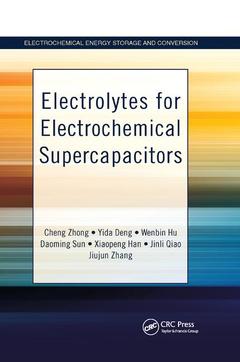Electrolytes for Electrochemical Supercapacitors Electrochemical Energy Storage and Conversion Series
Auteurs : Zhong Cheng, Deng Yida, Hu Wenbin, Sun Daoming, Han Xiaopeng, Qiao Jinli, Zhang Jiujun

Electrolytes for Electrochemical Supercapacitors provides a state-of-the-art overview of the research and development of novel electrolytes and electrolyte configurations and systems to increase the energy density of electrochemical supercapacitors. Comprised of chapters written by leading international scientists active in supercapacitor research and manufacturing, this authoritative text:
- Describes a variety of electrochemical supercapacitor electrolytes and their properties, compositions, and systems
- Compares different electrolytes in terms of their effects on electrochemical supercapacitor performance
- Examines the interplay between the electrolytes, active electrode materials, and inactive components of the supercapacitors
- Discusses the design and optimization of electrolyte systems for improving electrochemical supercapacitor performance
- Explores the challenges electrochemical supercapacitors currently face, offering unique insight into next-generation supercapacitor applications
Thus, Electrolytes for Electrochemical Supercapacitors is a valuable resource for the research and development activities of academic researchers, graduate/undergraduate students, industry professionals, and manufacturers of electrode/electrolyte systems and electrochemical energy devices such as batteries, as well as for end users of the technology.
Fundamentals of Electrochemical Supercapacitors. Electrolytes for Electrochemical Supercapacitors. Compatibility of Electrolytes with Inactive Components of Electrochemical Supercapacitors. Electrolyte Performance Validation Using Electrochemical Supercapacitor Cells. Challenges and Perspectives of Electrochemical Supercapacitors.
Cheng Zhong is an associate professor in the School of Materials Science and Engineering at Tianjin University. Prior to joining the faculty at Tianjin University, he worked as an associate professor in the State Key Laboratory of Metal Matrix Composites in the Department of Materials Science and Engineering at Shanghai Jiao Tong University. He earned his BSc and PhD in Materials Science from Fudan University in 2004 and 2009, respectively. Dr. Zhong’s recent research interests focus on the development of electrochemical metallurgy methods for preparing micro/nanostructured materials for electrochemical and electrocatalysis applications.
Yida Deng is a professor in the School of Materials Science and Engineering at Tianjin University. He earned his PhD from Shanghai Jiao Tong University in 2006. Dr. Deng’s research interests include metal and metal oxide nanostructures for electrochemical and energy applications.
Wenbin Hu is a professor and dean of the School of Materials Science and Engineering at Tianjin University. Previously, he worked as a professor in the Department of Materials Science and Engineering at Shanghai Jiao Tong University. He holds a BSc and PhD from Central-South University and an MSc from Tianjin University. Dr. Hu is a member of the Expert Group on Advanced Structural and Composite Materials in the new materials field of China’s 863 Program (National High-Tech Research and Development Program). He received the support of the National Science Foundation for Distinguished Young Scholars of China in 2011. Dr. Hu’s research interests focus on advanced micro/nanomaterials for energy storage and conversion.
Daoming Sun is chief technology officer at LiCeram Electronic Technology Co., Ltd. He earned his PhD in physical electronics from Fudan University and holds a bachelor’s degree in materials science and engineering from Xi’an University of Technology. His research focuses on the development of materials for e
Date de parution : 12-2019
15.6x23.4 cm
Date de parution : 05-2016
15.6x23.4 cm
Thèmes d’Electrolytes for Electrochemical Supercapacitors :
Mots-clés :
Energy Density; ESs; electrode; Organic Electrolytes; materials; Current Collector; operating; Operative Cell Voltage; cell; Cell Voltage; voltage; Electrode Materials; stability; High Electrochemical Stability; organic; Quasi-solid State Electrolytes; current; EDLCs; collector; Electrochemical Stability; charge; Pe Rc; Charge Storage Mechanism; Nuclear Magnetic Resonance; IL Electrolyte; EDL Capacitance; Excellent Cycling Stability; American Chemical Society; Electrochemical Capacitors; Pseudocapacitive Materials; Ionic Conductivity; Electrochimica Acta; Inactive Components; Active Electrode Materials; Pseudocapacitive Electrode Materials



